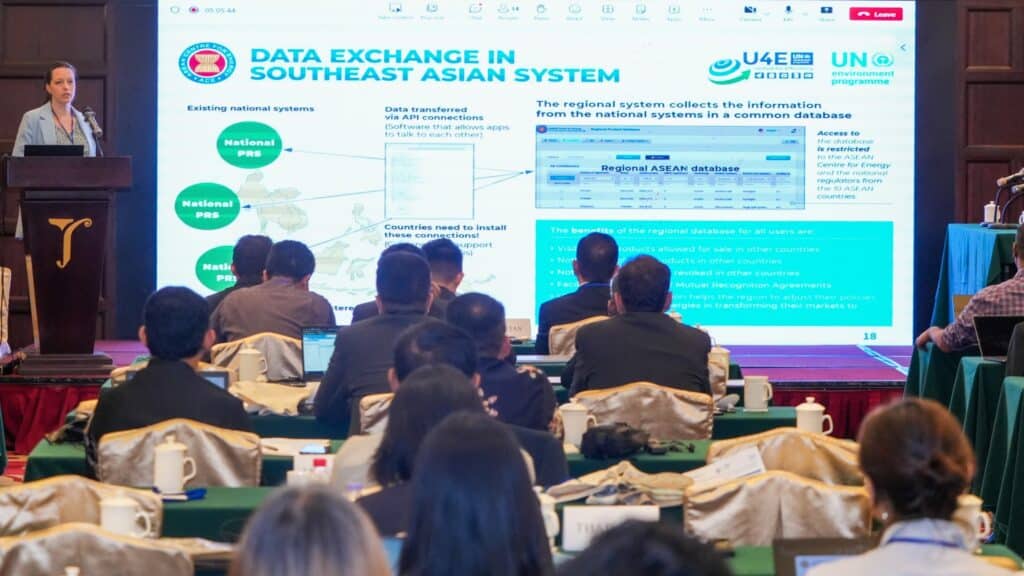On 20-21 May 2024, United for Efficiency (U4E) was pleased to take part in the third of the new series of Twinning Workshops, a collaborative effort convened by the Asia-Pacific Compliance Assistance Programme (CAP) of UNEP OzonAction in cooperation with the South Asia and Southeast Asia Network countries.
Participants from international organizations included UNEP’s OzonAction and Ozone Secretariat, the ASEAN Centre for Energy (ACE), the Multilateral Fund, GIZ, the United Nations Development Program (UNDP), the United Nations Industrial Development Organization (UNIDO), the World Bank, and international experts.
U4E experts Madeleine Edl and Saikiran Kasamsetty presented in two sessions: Information Material and Tools: Capacity Building, Certification, Data Collection and Initiatives under the U4E to promote energy efficiency in refrigeration and air-conditioning equipment—Model Regulation for Air conditioner, household refrigerator, and commercial refrigerator. They described the U4E tools and resources, such as product registration systems (PRS) and model regulation guidelines, available to support countries in their transition to more energy-efficient and climate-friendly products, as well as introducing U4E initiatives to promote energy-efficient refrigerators and air conditioners, such as the ASEAN Cool Initiative. Madeleine also participated in a finance panel sharing information on resource mobilization and financial mechanisms, such as on-wage and on-bill mechanisms that were implemented in Ghana and Senegal.
The two presentations were met with active participation from the attendees with insightful questions on topics like the Malaysia market assessment report for room air conditioners, the U4E PRS prototype, and model regulation guidelines. During the breakout sessions, more detailed discussions took place within the Southeast Asian grouping, sharing information on the Minimum Energy Performance Standards (MEPS) and labels in the individual countries and keen interest was shown in PRS activities and collaborating with U4E.
Before the event, participants indicated in a pre-survey that they saw the Workshop’s most significant potential in training and awareness raising. In addition, most participants wanted to learn more about best practices and international experiences.
The Twinning Workshops are designed to foster an interactive and participatory environment. They employ a variety of session formats, a mix of presentation types, theoretical content, practical demonstrations, plenary discussions, regional group breakouts, and a set of participant exercises. This approach facilitates a dialogue between the national counterparts and encourages active engagement from all participants.
They were developed based on the rationale that the Kigali Amendment to the Montreal Protocol on Substances that Deplete the Ozone Layer will help protect the climate by phasing down high Global Warming Potential (GWP) hydrofluorocarbons (HFCs), which are commonly used as refrigerants, and that promoting the energy efficiency of air conditioning and refrigeration technology and alternative cooling solutions can significantly increase those climate co-benefits.
For further information on the workshop, contact Madeleine Edl at madeleine.edl@un.org or Saikiran Kasamsetty at saikiran.kasamsetty@un.org. Please visit the OzonAction article about the workshop and the OzonAction Meeting portal, where all the materials from the workshop, including the workshop report, are readily available.
